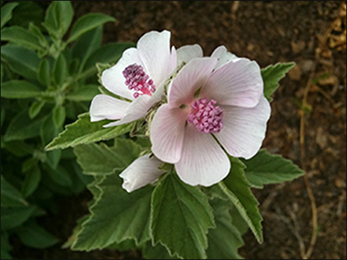What are the Therapeutic Properties of Marshmallow (Althaea Officinalis)?

Introduction
The generic name Althaea is derived from the Greek word which means 'to heal'. Thus, this herb is used to stimulate the body's healing capacity. Althaea officinalis or Marshmallow is a perennial herb that belongs to the Malvaceae family. This herb is native to Eastern Europe and also found abundantly in Punjab, Kashmir, and Himachal Pradesh. Roots, flowers, seeds and leaves are the useful parts of the plant which are used for the preparation of medicines. Other than the medicinal uses, marshmallow is widely used as an ornamental plant and also used in various oils, paints, glues, etc. Even the flowers are used as salads, and roots are used as a flavoring agent in various snacks, especially in Europe. Flowers of this herb resemble the flowers of A. Rosea Cav. This herb is widely used for medicinal purposes as traditional medicine. But because of the unavailability of much evidence, this herb doesn't get affiliation from various systems of medicines.
Vernacular Names
- Hindi - Gulkhero
- English - Marshmallow, Hollyhock
- Pharsi - Khatmi
- Unani - Khatmi, Gulkheru
- Sidha/Tamil - Shemai-tutti
Properties of Althaea Officinalis
This herb is not mentioned under detailed drugs in our Ayurvedic classics. But in Bhava Prakasha Nighantu there is a reference regarding Althea officinalis which is mentioned under 'Parishishta Varga'.
In Priya Nighantu the reference goes as :-
- Rasa (Taste) - Madhura (Sweet)
- Guna (Quality) - Snighdha (Unctuous), Picchila (Slimy) and Guru (Heavy)
- Virya - Sheet (Cold) in potency.
- Vipaka - An end product of digestion is Madhura (Sweet).
- Dosha Karma - Subsides Vata and Pitta dosha in our body.
- Effective medicine in the case of Pratishyaye (Rhinitis), Kasa (Cough), Atisaar (Diarrhea) and Mutrakrichra (Dysuria).
Pharmacological Actions
- Demulcent - This herb has a demulcent property which helps to cover the inner mucosal lining of the gastrointestinal tractgastrointestinal tract. Hence it is useful in enteritis.
- Antitussive - It has an expectorant property that helps to eliminate the excessive mucous along with the toxins from the body. Therefore, it is helpful in cough, asthma, bronchitis, etc.
- Antilithic - Helps to break down calculi or stones in our body. Hence, it is useful in calculus.
- Diuretic - This property is helpful in eliminating toxins from the body via urine hence useful herb in kidney stones, burning micturition, gastritis, etc. It easesthe difficulty in urination thus, a medicine of choice in dysuria.
- Anti-inflammatory - Due to this property it is used to fight against inflammation and infections.
- Laxative - It also has a mild laxative action on our body hence used toeliminate toxins from the body.
- Immune-modulator - This herb directly impacts our immune system thereby used to enhance immunity.
- Anti-microbial - Marshmallow exhibits this property hence deals with all the infections in the body.
Chemical Composition
The marshmallow plant contains - mucilage, starch, pectin, flavonoids (kaempferol, quercetin), tannins, phenolic acids, polysaccharides, asparagines and sucrose. It also contains various phytochemicals like lauric acid, β-sitosterol,stigmasterol, lanosterol, altheacalamene, etc.
Therapeutic Uses of Marshmallow
- It is useful in case of gastric and peptic ulcers. Because of its soothing and demulcent properties, it reduces inflammation and infection in the body.
- It relieves oral and pharyngeal mucosa, cough because of its antitussive properties. It eliminates the extra mucosa from the oral cavity and respiratory system hence, widely used to manage the cough.
- Chronic Gastritis - It is helpful to manage the HCl level in our stomach, hence cures burning sensation, bloating and irritation. Along with that it also counters the pH level in the whole body like - urine, blood, gastric juices, etc. and because of its demulcent property, it lines the inner lining of the stomach hence prevents gastric irritation.
- Topically it is used in skin ulcers, bruises and varicose veins.
- It also has antiseptic property hence beneficial to cure ulcers, wounds, cuts and burns.
- This herb is used to reduce cholesterol and blood sugar level in our body.
- Overall this herb is beneficial to treat the Gastrointestinal, Urinary and Respiratory tract disorders.
Mode of Use
Marshmallow can be used internally as well as externally. It can be used in the form of a paste, syrup and decoction.
- Paste - In case of skin problems, bruises and ulcers the paste prepared from the roots and leaves can be applied locally to reduce swelling and heals wounds. Moreover, the paste can be applied over muscle sprains and insect bites.
- Decoction - In the case of Oral ulcers and Pharyngitis, to heal ulcers we can use the decoctions prepared from the roots for gargling.
- Even the decoction can be used to wash ulcers and wounds as the plant has 'Vranaropaka' property therefore it promotes early healing.
- An infusion of the leaves can be used internally to cure painful urination and cystitis.
- Twig of this plant can be used as a brush to ease tooth pain and tooth sensitivity.
- Poultice - Seeds and leaves are mostly tie over the inflammation.
- Herbal Tea - In case of sore throat, you can drink tea prepared from the dried roots of the Marshmallow plant as it reduces pain and eases the soreness. Moreover, this herbal tea is full of anti-oxidants and nutrients that prove to be beneficial for your body.
Useful Parts - Roots, flowers and leaves
Dosage - 5 to 7 grams.
Note - Before using "Marshmallow' as a medicine please contact a physician because in some cases this herb has shown some toxic effects on the body.



